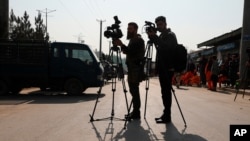Human rights and media freedom advocates are urging authorities in Afghanistan to release four journalists arrested this week on charges they were “spreading enemy propaganda.”
It was not immediately known whether the journalists have formally been charged, nor have Afghan authorities discussed their fate since taking them into custody Monday.
“As the Afghan conflict escalates, all parties seem intent on silencing the country’s media,” lamented Human Rights Watch (HRW) in a statement issued late Friday. “Unless charged with a genuine crime, the four journalists should be released immediately.”
The journalists - Mohib Obaidi, Sanaullah Siyam, Qudrat Sultani and Bismillah Watandost - were arrested after they returned from a reporting trip to the Taliban-held district of Spin Boldak in southern Kandahar province. They had traveled to the district to investigate reports of Afghan civilian killings by Taliban insurgents.
Obaidi, Sultani and Watandost are reporters of Kandahar-based Millat Zagh Radio, and Siam, is a free-lance cameraperson.
“The arrests …underscore rising concerns the Afghan government is trying to shield itself from media criticism. Among the many threats they face, Afghanistan’s embattled journalists should not also have to face prosecution for doing their jobs,” said HWR.
An Afghan interior ministry spokesman defended the action Tuesday, stressing it was unlawful to broadcast propaganda in favor of an enemy or against the interests of the country.
Officials also insisted the detainees ignored government warnings to journalists not to enter Spin Boldak, where Reuters photojournalist Danish Siddiqui was killed on July 16 while covering clashes between Afghan security forces and Taliban fighters.
The Afghan Journalists Safety Committee denounced the arrests and demanded on Tuesday the government release the journalists “as soon as possible.” The local watchdog pressed the government to refer the case to “the Media Complaints Commission to ascertain whether any violation has taken place or not” in line with relevant laws.
Taliban spokesman Mohammad Naeem condemned the arrests and argued the journalists were simply trying to "follow the events and try to reveal the facts.”
HRW noted in its Friday’s statement that Afghan officials also have ordered the arrests of journalists reporting on civilian casualties from security force operations.
The watchdog group said the Taliban have demonstrated no tolerance for the media and are believed responsible for “the vast majority of recent attacks” on journalists. “But the government has rarely investigated attacks on journalists, even when these take place in cities under government control.”
France-based Reporters Without Borders’ regional office and other media freedom advocates, while speaking Friday in Kabul, expressed serious concerns about the safety of journalists in the wake of the deteriorating security situation in Afghanistan and demanded the four journalists be immediately freed.
The Committee to Protect Journalists (CPJ) also called on Afghan authorities to immediately release the four journalists and “drop their investigation, and cease harassing journalists for their work.”






